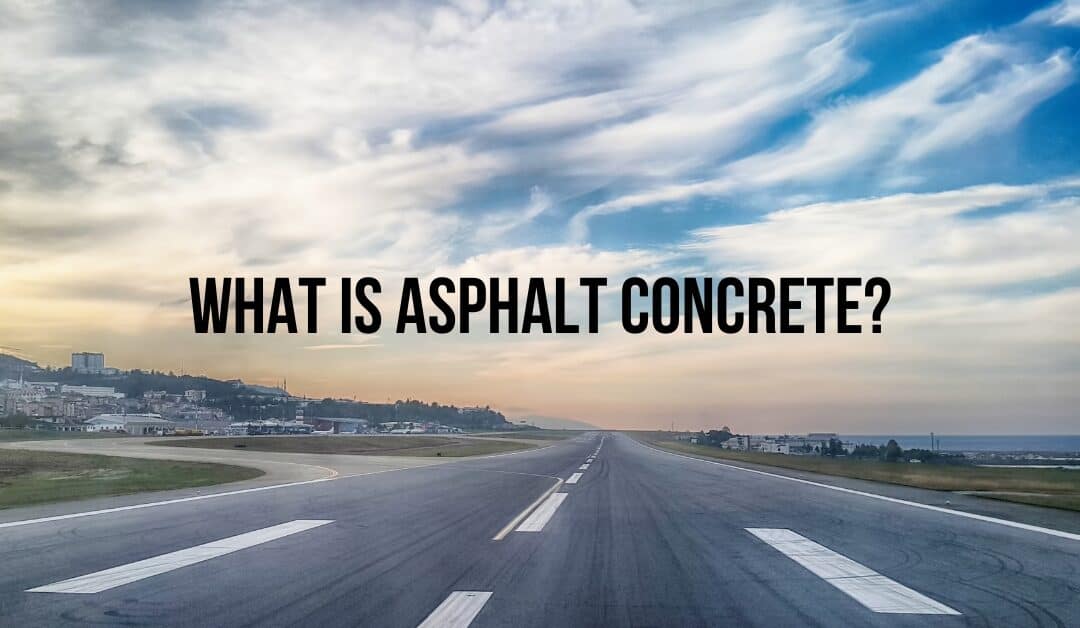Paving contractors use asphalt concrete to construct roads, highways, airports, parking lots, and other types of pavement. It’s used for various applications, such as driveways, sidewalks, and even roofing! In this blog, we will look at what asphalt concrete is and why it may be the best choice for your paving project!
What Exactly is Asphalt Concrete? (Asphalt Cement)
Asphalt Concrete is a composite material that those in the construction industry often call “asphalt” or “blacktop.” The exact definition of “concrete” is any composite material composed of mineral aggregate glued together with a binder.
However, for those of us without engineering degrees, we think of concrete as the lighter-colored cement that makes up a “concrete” driveway. In general, for those of us not in the paving business, we think of blacktop as simply “asphalt.”
As a versatile pavement material, the different asphalt types often have names, including:
- Hot mix asphalt (HMA)
- Warm mix asphalt (WMA)
- Asphalt plant mix asphalt
- Asphalt concrete
- Bituminous asphalt concrete
- Blacktop
- Recycled asphalt
- Superpave
- Reclaimed asphalt pavement
HOT MIX ASPHALT (HMA)
Hot mix asphalt pavements consist of a mixture of aggregate (crushed stone, gravel, and sand), bitumen, and liquid asphalt heated to temperatures between 275 and 325 degrees Fahrenheit. A hot mix asphalt concrete can
COLD MIX ASPHALT (CMA)
Cold mix asphalt consists of a mixture of emulsified asphalt, bitumen, and aggregate heated to a lower temperature between 0 and 100 degrees Fahrenheit. Your contractor produces a cold mix asphalt without heating and uses it only for light traffic areas.
WARM MIX ASPHALT (WMA)
Warm mix asphalt consists of a mixture of emulsified asphalt, aggregate, and asphalt binder heated to a lower temperature between 200 and 250 degrees Fahrenheit. The mineral aggregates do not rise to a temperature high enough for the same chemical reaction as a hot mix.
Choosing the Best Pavement Construction for Your Project
The type of asphalt mix your contractor chooses will depend on the type of vehicle use you plan for your project. Your contractor will ask how much load you expect before making a pavement design. With different asphalt mixes come different performance characteristics.
For example, if you’re planning a large shopping center with large trucks distributing goods daily, you’ll need an asphalt mix to hold up to that kind of pressure and stress!
You wouldn’t use the same mix for a driveway that you would in a large distribution center expecting daily heavy loads. If you did, the asphalt would not last long!
Without the proper asphalt mix, the surface durability does not hold, and you see fatigue cracking and, eventually, pavement failure. You don’t want heavy trucks to wear down the life of your asphalt quickly. Grade depressions and tire wear can occur with the wrong choice of asphalt mix!
When you expect the “wheel loads” on pavement building materials to place heavy weight, the contractor must consider the asphalt mix design.
However, in addition to weight resistance, the asphalt also must have a level of flexibility to resist cracking.
Because there is a fine line between weight resistance and flexibility, the choice of asphalt mixtures matters. Your asphalt contractor will consider asphalt mixes to attain optimum durability for your particular project.
What Role Does Asphalt Binder Play?
Asphalt Binder is the glue that holds the asphalt mix together. It’s a sticky black liquid that helps keep all components bound together so they don’t separate during application or use. Asphalt binder also has properties that allow it to expand and contract with temperature changes, helping prevent cracking and other damage due to temperature fluctuations.
Asphalt binder is an oil-based material that can come in different grades depending on the project. Your contractor can determine which type of asphalt cement binder is best for your project based on factors like temperature changes, loads applied to the surface, and more.
When choosing an asphalt, your contractor may consider a virgin asphalt binder, a polymer-modified asphalt binder, or an emulsified asphalt. Each type of binder provides different properties and is used for various applications.
For instance, a polymer-modified asphalt may be the best choice if you are looking for a highly durable pavement surface because it has a higher resistance to cracking under extreme temperature changes.
How to Maintain an Asphalt Pavement
Engineering and construction documents may include storm drains to extend the service life of your asphalt. Because water damage can cause your existing pavement structure to crack, it’s crucial to build in features to remove water from the surface.
In addition, it’s essential to do preventive maintenance to extend the life of your existing pavement. Seal coating is a cost-effective way to prevent more intensive repairs down the road.
Maintenance practices that include a seal coat every 2-3 years keep asphalt pavement strong and resilient! A seal coat is simply a thin layer of high-density polyethylene or similar surface treatment.
Each time your asphalt contractor comes to do maintenance, they will use a bituminous crack sealer for sealing small cracks before starting with the seal coat. Crack sealing is crucial to prevent enlarging cracks and generally increasing the expense of your maintenance!
Our Experienced Asphalt Contractors Can Help
At AMP Paving, we have decades of experience in designing, creating and maintaining quality asphalt surfaces. We understand the best practices for using the proper asphalt mix and binder.
We also know how to create storm drainage systems to help keep water off your pavement, as well as use seal coating and crack sealer to extend the life of your pavement! Contact us today for a free quote and find out how we can make your asphalt project work for you!

